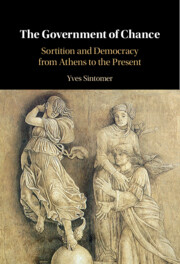 French political scientist Yves Sintomer has published a new book dealing with sortition called The Government of Chance: Sortition and Democracy from Athens to the Present.
French political scientist Yves Sintomer has published a new book dealing with sortition called The Government of Chance: Sortition and Democracy from Athens to the Present.
The publisher, Cambridge University Press, provides a(n apparently auto-translated) book description:
Electoral democracies are struggling. Sintomer, in this instructive book, argues for democratic innovations. One such innovation is using random selection to create citizen bodies with advisory or decisional political power. ‘Sortition’ has a long political history. Coupled with elections, it has represented an important yet often neglected dimension of Republican and democratic government, and has been reintroduced in the Global North, China and Mexico. The Government of Chance explores why sortation is returning, how it is coupled with deliberation, and why randomly selected ‘minipublics’ and citizens’ assemblies are flourishing. Relying on a growing international and interdisciplinary literature, Sintomer provides the first systematic and theoretical reconstruction of the government of chance from Athens to the present. At what conditions can it be rational? What lessons can be drawn from history? The Government of Chance therefore clarifies the democratic imaginaries at stake: deliberative, antipolitical, and radical, making a plaidoyer for the latter.
The first two chapters of the book provide a history of the use of sortition. The third chapter is titled “The Disappearance of Sortition in Politics: A Historical Enigma”. The chapter is summarized as follows:
Chapter Three tackles the historical enigma of the disappearance of sortition from politics following the French and American revolutions. First, it highlights the “great divergence” between China and the West on this issue, the former using sortition (jointly with imperial examinations) until the beginning of the twentieth century. Next, it unearths the causes of the two-century partial eclipse of random selection in Western politics, at the same time as the technique was employed for the appointment of trial juries. In fact, the random selection of juries was linked to the idea that jurors were interchangeable sources of common sense. On the contrary, the Swiss debate that was waged during the revolutionary period at the turn of the eighteenth century shows that the new rationalist ideas that emerged with the advent of modernity and the Enlightenment viewed the use of chance as a blind and irrational vestige of the past. At that time, the notion of the representative sample, which is familiar to contemporary readers, had not yet been developed. Consequently, even those who defended a descriptive form of representation, where representatives sociologically resemble the people they represent, could not lay claim to sortition when defending their ideal.
Chapter 4 discusses sortition in recent times: justifications and applications.
Finally,
Chapter Five engages a normative discussion. It presents a case for return of sortition to the political systems of the Global North. It discusses the main challenges that random selection faces: How is it possible to justify a new kind of representation and to develop a functional epistemic democracy without being kept in the trap of consensus? Four potential roles of sortition bodies are then analyzed: opining, monitoring, judging, and legislating. A systemic democratization of democracy is proposed. Minipublics may be a source for democratizing democracy, a platform for a more enlightened public opinion and a more responsible public action: In short, for a dynamic that runs counter to both postdemocracy and authoritarianism. However, the chapter defends the shift from the minipublics to the legislature by lot, and the necessity to go beyond deliberative democracy. It summarizes the main ideas contained in the volume, opening a broader perspective on how random selection may help to reinvent politics and democracy in the twenty-first century. It defends that democracy 3.0, which differs both from the democracies of the Ancients and the Moderns, could be a “real utopia.”
Filed under: Academia, Athens, Books, Deliberation, Elections, Juries, Sortition |



Have you seen the price?! 😨
>
LikeLiked by 1 person
👉 https://www.eventbrite.com/x/the-keys-to-democracy-a-conversation-with-hugh-pope-and-yves-sintomer-tickets-567672603037
LikeLike
I’m curious. Is it a translation of his earlier work in english or an original research?
LikeLike
> Have you seen the price?! 😨
Unfortunately that’s standard practice with “academic publishing”. Work that is publicly funded is outrageously priced for private profit.
LikeLike
[…] Two notable books dealing with sortition published this year were the late Maurice Pope’s The Keys to Democracy that was originally written in the 1980’s and Yves Sintomer’s The Government of Chance. […]
LikeLike